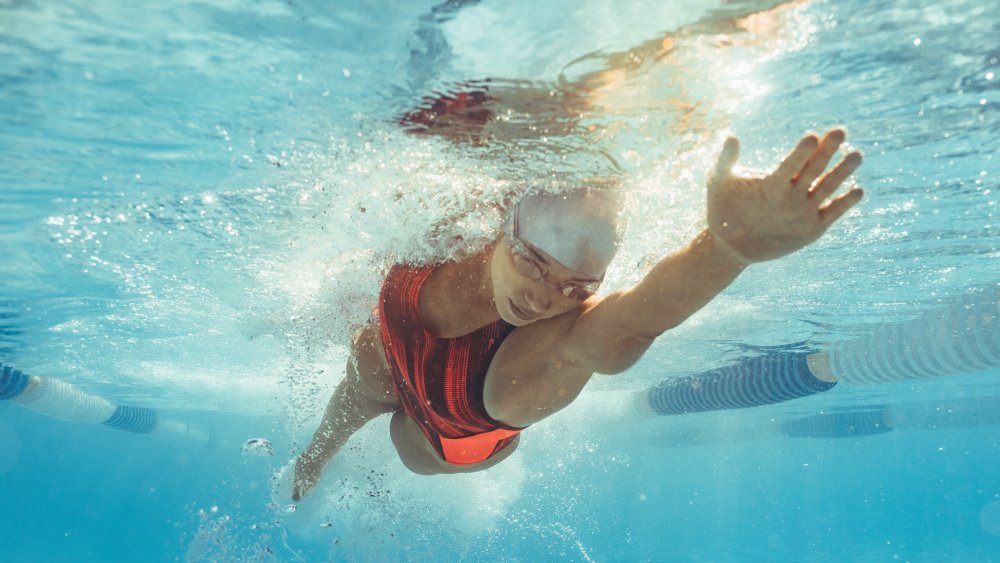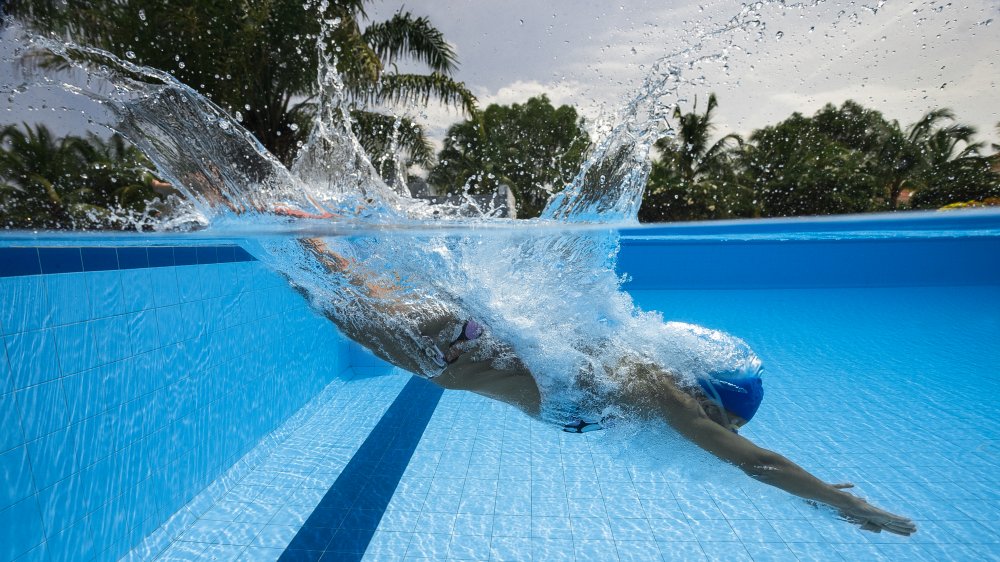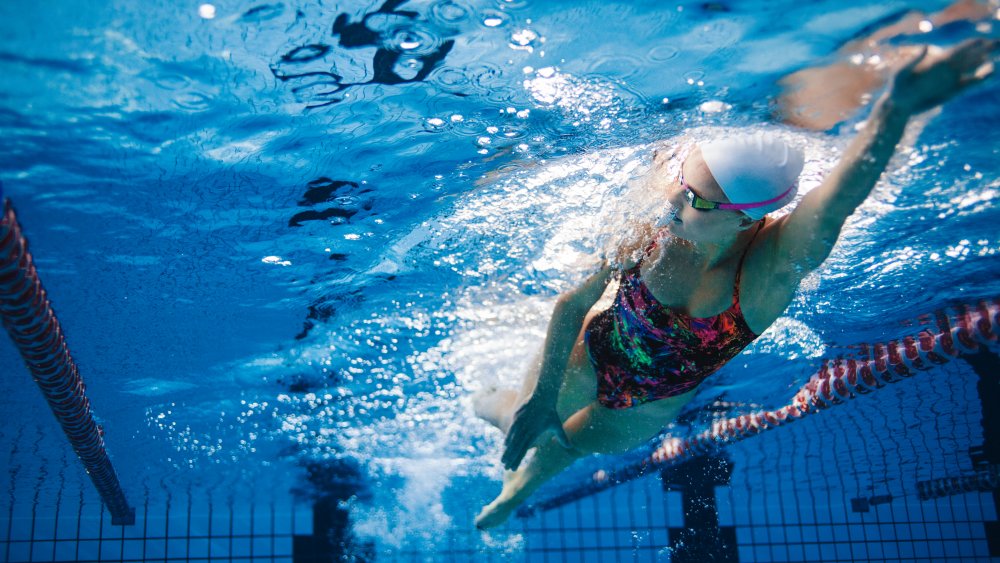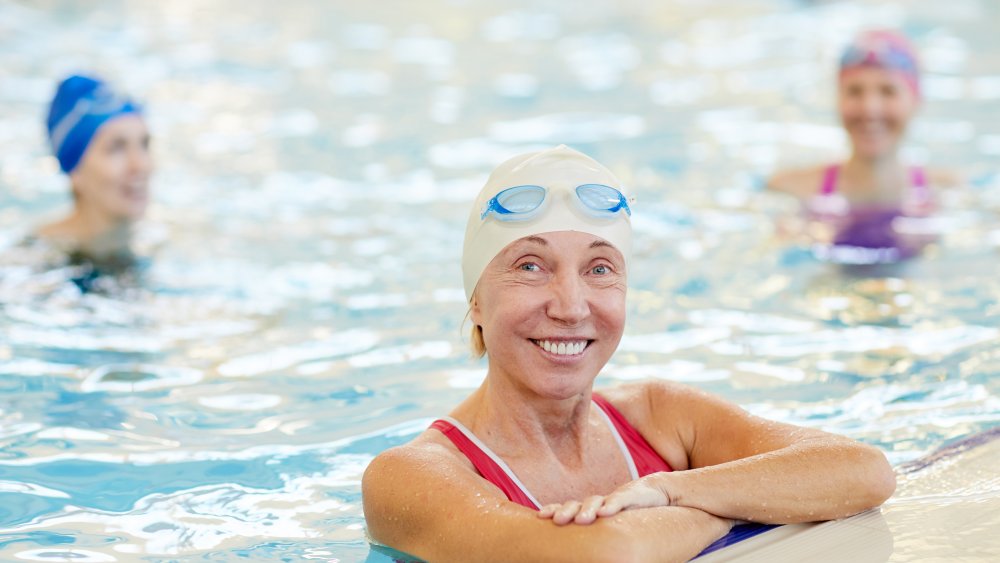When You Go Swimming Every Day, This Is What Happens To Your Body
Swimming every day is good for the mind, body, and soul. A dip into your backyard pool or nearby lake does wonders for your health. Unlike other types of cardio exercises like biking or running, swimming works your entire body from head to toe and burns major calories. Thankfully, you don't need to swim 100,000 yards a week like Olympic swimmer Michael Phelps in order to see results.
Yards aside, just swimming in a body of water every day will help you develop stronger muscles (hello, swimmer's bod), heart, and lungs, as reported by Time. Swimming is also great for your mind. Take it from four-time Olympic medalist Maya DiRado, who told Shape that swimming is an "amazing stress reliever."
Yes, going for a daily swim can work wonders for your body and mind, but it can also wreak havoc if you're not careful. Before diving off the deep end, you should know what happens to your body when you go swimming every day. Keep reading to find out.
You'll have a tight bod in no time if you go swimming every day
Hate jogging in the summer heat? Same. This is why swimming in a public pool or ocean is a great alternative, especially when you can burn just as many calories doing so. Exercise physiologist Tom Holland told Healthline that while certain factors, like intensity, determine how many calories you burn while swimming, he said that generally a "150-pound person will burn roughly 400 calories during an hour-long swim at a moderate pace and 700 at a vigorous one." Not bad, not bad at all! If you swim every day, you're also working your entire body, toning muscles literally everywhere. Your body is also building strength and endurance thanks to the water's moderate resistance.
Your cardiovascular system is also winning. According to Healthline, your heart and lungs become stronger as you make swimming a regular part of your exercise routine. So go crazy on those backstrokes, butterflies, and breaststrokes. You'll be bikini-ready in no time.
You'll expose your hair to harsh pool chemicals if you go swimming every day
While your body may benefit from swimming every day, you risk ruining your hair when plunging into the water. This is especially true if you frequent your backyard or neighborhood pool. You can get "swimmer's hair" if you don't take steps to protect your locks. While chlorine is necessary to kill bacteria in pools, your hair may end up a dry, tangled, and discolored mess as a result.
According to ThoughtCo., pool chemicals, including chlorine and bromine, react with your hair's protective oils and expose your hair's cuticle. This opens up your hair to copper compounds that can give your locks a greenish hue. Pool chemicals can also cause dryness and significant damage.
There are things you can do to prevent damage, like wearing a swim cap or rinsing your hair with water before and after a swim. Jenna Laramee, a spa director at a Ritz-Carlton in Florida, told Allure that hair acts like a sponge when it's exposed to water. However, "it can only absorb so much moisture, so loading your hair with water and hydrating oils [like leave-in conditioner] can help minimize the space for chlorine to fill," she explained.
You risk getting sun damage if you swim outside every day
The sun's ultraviolet rays can be just as harmful to your hair as pool chemicals. When you swim in the ocean or in an outdoor pool, you're exposing your hair to UVA and UVB rays, which can strip away your hair cuticle, leaving it exposed to sun damage, according to the Cleveland Clinic. Typical tell-tale signs of sun damage include dryness, split ends, discoloration, and frizziness.
Dermatologist Wilma Bergfeld told the Cleveland Clinic that the sun damages not just your hair's cuticle, but also its protein (keratin). And watch out, blondes. Your hair is more prone to sun damage if it's light-colored or fine. It doesn't help matters if you use bleach to color or highlight your hair or if you use heat styling products like flat irons. "If you bleach or highlight your hair, you've damaged the hair already," Bergfeld added. "To add to that by swimming in a chlorinated pool, or sitting out in the sun, you're going to have very significant hair breakage."
By swimming early in the morning or later in the evening, you can avoid getting too much sun to your hair and skin.
You might notice a skin rash if you go swimming every day
Your skin may be at risk if you swim every day — and we're not just talking about a sunburn. You may develop what is called a "chlorine rash" if you regularly swim laps in the pool. The itchy rash is often visibly red with small bumps or hives, according to Healthline. As its name suggests, chlorine rash is caused by a sensitivity to the pool's chlorine, but it's not particularly dangerous, board-certified dermatologist Joely Kaufman told Women's Health. "You'd much rather have irritation from the chlorine than a bacterial infection from other people who are swimming," she explained.
It's important to note that even salt water pools contain small amounts of chlorine. If you swim in fresh water, you're not completely safe either. You can contract what is called swimmer's itch, aka cercarial dermatitis, from "microscopic parasites" found in fresh and salt water. Luckily, there are ways to reduce your risk of both skin conditions.
When it comes to the chlorine rash, shower before and after a swim to rinse off any lingering chlorine. And for swimmer's itch, don't swim in any area with unsafe water signage, the Centers for Disease Control and Prevention reported.
If you go swimming in a pool every day, you might suffer from dry skin
You'd think swimming every day in a pool would hydrate your skin, but it can actually dry it out, according to Miami-based dermatologist Ana Duarte. She told Live Science that "too much chlorine can cause a lot of [skin] irritation." Chlorine strips your skin of its natural oils, which can cause dryness, but it's not hazardous to your health. "If you do get a little bit of minor irritation, you can certainly shower off right after the pool and apply a good moisturizer to replenish some of those natural oils," Duarte said.
As of this writing, there isn't a topical product available that can create a barrier between chlorine and your skin, but Georgia dermatologist Lauren Ploch told Allure that there is a theory that suggests thicker sunscreen may protect your skin from pool chemicals. While the jury is still out on that one, Ploch recommended swimmers moisturize after a dip in the pool with a skin lotion that includes ceramides and alpha hydroxy acid. Pay special attention to the areas of your body with thinner skin, including your elbows, shoulders, chest, and under-eye area.
Your nails may become dry and brittle if you go swimming every day
Ever wonder why your nails are dry, cracked, and break easily? Maybe it's because of your daily swim routine. "In a very chlorinated pool, the chlorine can get into your pores, causing irritation and dryness," Joely Kaufman, dermatologist and director of Skin Associates of South Florida, told Women's Health. Your nails are no exception.
Hydrating your nails can be as easy as using hand moisturizer on the daily, Women's Health reported. And, according to Allure, there are things you can do throughout the day to protect your nails and make them stronger before and after any swim sesh. Be sure to avoid using too much acetone nail polish remover, wear gloves while cleaning and washing dishes, and apply a strengthening top coat to your nails to protect them from chlorinated pools.
Although frequent swimmers may notice their nail polish chips more easily compared to non-swimmers, don't skip the manicure. "Nail polish is actually protective for those who swim because it helps to reinforce the weak bonds between the cells within the nail," dermatologist Dana Stern told Nails magazine.
You might develop red eyes if you go swimming in a pool every day
When it comes to your eyes, swimming in salt water may be a better option, according to optometrist Arthur Kobayashi. "Saltwater is a more natural approach and safer on skin, hair, and your eyes," he told VSP Vision Care.
Unlike saltwater pools, chlorinated water has more chemicals that may irritate and redden your eyes. But it's actually not solely the chlorine that causes this problem. It's the combination of chlorine with sweat and urine that creates a chemical called chloramine, which can then irritate your eyes, the Centers for Disease Control and Prevention explained. Red eyes occurs when "blood vessels near the surface of the eye become enlarged and dilated," said Kobayashi.
Just because you suffer from red eyes, that doesn't mean you can't swim in a pool ever again. Try wearing goggles to protect your eyes, Kobayashi suggested. It's not a bad idea to have saline eye drops on standby as well.
If you go swimming in contact lenses every day, you could get an eye infection
You might want to listen to your eye doctor the next time you're told you shouldn't wear contacts while swimming. If you don't heed that advice, you'll be at a higher risk of developing an eye infection as a result of the bacteria found in water (via VSP Vision Care). "It doesn't matter if it's fresh water or a chlorinated pool," Dr. Timothy Gibbons, an optometrist, explained to University of Utah Health. "There are bugs and pathogens that chlorine doesn't kill, which could potentially cause damage to the cornea, infection, or ulcers." Ouch!
According to the university, contact lenses are considered "porous" and, as a result, allow "chemicals and bacteria to lodge inside the lens and press against your eye." If you do wear contacts while swimming, optometrist Arthur Kobayashi recommends wearing swimming goggles. "The water could damage your lenses — they could change shape, rip, fold in your eye, or even get washed away," he told VSP Vision Care.
If you want to lose weight, consider swimming before breakfast every day
While you can swim anytime of the day and still receive the benefits of a full-body exercise, a morning swim may be better if your goal is to lose weight, according to Speedo. Swimming on an empty stomach about an hour prior to breakfast time is best. Why? "Because your carbohydrate stores have been depleted overnight, your body has no choice but to raid your fat stores for fuel," the article stated.
Not only are you burning more calories during your AM swim, but you're also waking up your body's metabolism, which, in turn, will burn those calories faster throughout the day, even while you're desk-bound at work. If you can't stomach the idea of waking up early to swim, you can still burn plenty of calories and tone your muscles with an afternoon or evening workout routine.
If you go swimming every day, you may sleep better at night
If you go for a swim every day, you probably don't need a fancy pill to fall asleep at night. A 2010 study on aerobic exercise and chronic sleep disorders found that people aged 55 or older who exercised (used the elliptical, swam, etc.) more slept better and longer.
Although there's no known "mechanism that explains how [exercise and sleep] are related," according to Dr. Charlene Gamaldo, John Hopkins Center for Sleep's medical director, there's no denying the fact that there is a strong link between them. "We have solid evidence that exercise does, in fact, help you fall asleep more quickly and improves sleep quality," Gamaldo said. What isn't yet known is how late in the day you should exercise before it impacts your sleep. "I encourage people to listen to their bodies to see how well they sleep in response to when they work out," she added.
With just 30 minutes of aerobic exercise at a time, you may notice an improvement at bedtime. Even Olympic swimmer Michael Phelps understands the relationship between sleep and swimming. Sleep is "where you can naturally grow and your body recovers," Phelps told CNBC.
Your back will thank you if you swim every day
If you swim every day, you may be able to keep back issues at bay. That's because this low-impact, horizontal workout counterbalances any of the time you may spend sitting behind the steering wheel or at your desk. Swimming is also better on your back than other aerobic exercises. "There's no hard impact on your back like there is with running, and instead of being bent forward like you would be on a bike, your back tends to be arched slightly in the opposite direction," David Tanner, a research associate at Indiana University, told Time.
You may not only improve your back posture while swimming but also prevent any injuries related to a sedentary lifestyle. If you already suffer from a lower back or neck injury, you may want to avoid certain swim strokes and wear a mask and snorkel to avoid arching your injured back while swimming, according to Veritas Health.
Going swimming every day may reduce your stress levels
You may feel calmer and happier if you go swimming every day. It's universally known that all forms of exercise bring on a release of stress-relieving endorphins. But, according to a study published in 2019, swimming goes a little further when it comes to relieving stress. Findings in the study showed that aquatic physical activities helped relieve painful symptoms in patients suffering from conditions prompted by chronic stress.
As a result of the study, water therapy is recommended "as a nonpharmacologic therapeutic approach in the management of [fibromyalgia syndrome]." What makes aquatic activity different from all other forms of exercise is the following four factors: buoyancy, resistance, hydrostatic pressure, and thermal conduction. Buoyancy, for example, helps "improve muscle activation and range of movement" as well as lessen "perceived fatigue." So slip into your bathing suit and get ready to reap the stress-relieving benefits swimming has to offer.
You'll breathe better if you go swimming every day
You'll pretty much have lungs of steel if you go swimming every day. Seeing as oxygen isn't exactly readily available when you're underwater, your body has no choice but to learn how to use air "more efficiently," New York City swim coach Earl Walton explained in an interview with Shape. With every inhale and exhale as your head bobs over the water, your body will in turn develop a lower "resting heart [rate]" and "blood pressure."
Keep in mind that while swimming is great for your lungs, you may want to practice caution when swimming indoors, according to the Cleveland Clinic. There's typically a higher concentration of chlorine in indoor pools. "If an indoor pool isn't regulated well, swimmers can begin to see symptoms of tracheobronchitis, such as coughing or maybe some wheezing," pulmonologist Rachel Taliercio explained. "There might be some burning in the throat."
If you go swimming every day, you might just live longer
If you go swimming every day, you might be adding years to your life. A three-decades-long study published in the International Journal of Aquatic Research and Education found that swimming reduces one's chances of dying prematurely. While the study focused on men aged 20 to 90 between the years 1970 and 2003, any person — man or woman — can benefit from swimming and physical exercise in general.
Ultimately, any type of physical activity is better than nothing. As one of the study's authors, Steven N. Blair, explained, at least 150 minutes of moderate exercise or 70 minutes of vigorous exercise is recommended each week. Swimming can be both moderate and vigorous depending how fast you swim and for how long. The study couldn't conclude whether or not swimming is better than other forms of exercise. However, according to Blair, "swimmers had significantly lower risk of all-cause mortality compared not only to those with sedentary lifestyles ... but also to either walkers or joggers." Long story short: Just keep swimming!














